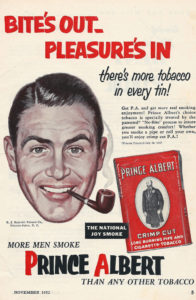What does the name New Nicotine Alliance (NNA) mean to you?
The word ‘new’ here is ambiguous. Is the organisation one that supersedes a previous nicotine alliance, or is it new in the sense that a pair of trousers is new when you buy it but after having been worn for a while can no longer be so described? It seems the latter sense applies, so it’s not a very good name from the first word.
All right, Dr Symonds, that’s enough nitpicking. Let’s move on to the next two words: Nicotine Alliance. These imply the existence of a group of people pursuing a common interest involving nicotine. And what might that be? Well, if we turn to their website it’s not entirely clear. So I wrote to the Chairlady of the Board of Trustees, Sarah Jakes, and she agreed that the aims of the NNA, as opposed to their activities and her personal convictions, could fairly be recast as:
To advocate greater understanding of (allegedly) safer (relative to cigarettes) nicotine products in the belief that this understanding will contribute to reduced cigarette smoking.
What they are referring to in order to achieve the noble aim of contributing to reduced cigarette smoking is e-cigarettes.
Now, anyone may form an alliance with anyone else and advocate (within the law) anything they wish, but since the NNA has been granted the status of a UK Registered Charity, no less, surely they are answerable to the public to explain themselves.
What is the next word that comes to mind if one says ‘nicotine’? A common association is, of course, ‘addiction’. This word, however, does not appear on the NNA website.
Ms Jakes and some of her colleagues on the Board of Trustees make no secret of the fact that they used to be smokers and have now taken up vaping instead. So I wrote and asked her if she recognised e-cigarette use as drug (nicotine) addiction.
The answer was a fudge: ‘The definition of addiction is, in itself, a contentious issue.’
How about the Shorter Oxford English Dictionary (SOED)? It defines addiction as ‘The state of dependence on a drug to the extent that it cannot be withdrawn without adverse effects.’ That should be clear enough.
Another question I asked Ms Jakes was: ‘How many puffs or sucks per day does a typical e-cigarette user take and is this done every day?’ She couldn’t tell me. In that case, how many puffs or sucks does she herself take on her e-cigarette device every day, approximately? Is it dozens or hundreds? She refused to say.
All right, then please tell me why people vape. Is it for enjoyment and, if so, what exactly is enjoyable about it? She did at least answer this question:
Generally, people enjoy vaping for similar reasons that people enjoy coffee: for the sensory effects such as taste, the feeling of the vapour as they inhale and exhale it, the mild stimulatory effects of nicotine, and also the social effects of a sense of identity, of an activity shared with others, of solving a problem (the harm from smoking) and being able to help others do the same, and of finding new friends through a shared interest.
This is what many smokers and vapers say, but is it true? In what I intended as a final email to this good lady I put it like this:
The reason I am asking about your personal vaping habits is that I suspect you vape for the same reason you used to smoke: nicotine addiction. Or to put it in another way, you vape because of your perceived inability to quit.Therefore, I think the NNA website is misleading by what it leaves out. In my view you should make it clear that you are advocating the use of e-cigarettes as a way of continuing nicotine addiction that appears – but is not yet proven – to be safer than smoking.
A reply came immediately. The SOED definition of addiction was dismissed and my statement that e-cigarettes have not yet been proved to be safe was called absurd.
It seems if you enjoy vaping so much that you take dozens or even hundreds of sucks upon your e-cigarette device, inhaling a rhubarb-and-custard-flavoured aerosol laced with nicotine every day for years on end, it doesn’t matter if you’re addicted to the nicotine because it’s absurd to think this may not be safe!
Text © Gabriel Symonds


Leave A Comment